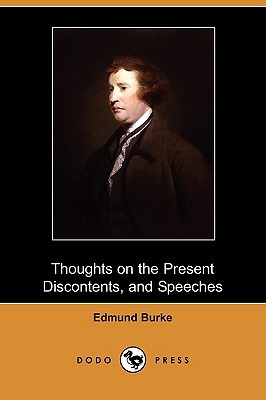
- We will send in 10–14 business days.
- Author: Edmund Burke
- Publisher: Dodo Press
- ISBN-10: 1409969282
- ISBN-13: 9781409969280
- Format: 15.2 x 22.9 x 0.7 cm, minkšti viršeliai
- Language: English
- SAVE -10% with code: EXTRA
Thoughts on the Present Discontents, and Speeches (Dodo Press) (e-book) (used book) | bookbook.eu
Reviews
Description
Edmund Burke (1729-1797) was an Anglo-Irish statesman, author, orator, political theorist, and philosopher who, after relocating to Great Britain, served for many years in the British House of Commons as a member of the Whig party. He is mainly remembered for his support of the American colonies in the dispute with King George III and Britain that led to the American Revolution and for his strong opposition to the French Revolution. Burke worked on aesthetics and founded the Annual Register, a political review. He is widely regarded as the philosophical founder of Anglo-American conservatism. Burke's first published work, A Vindication of Natural Society, appeared in 1756. In 1757, he published a treatise on aesthetics, A Philosophical Enquiry into the Origin of Our Ideas of the Sublime and Beautiful. His other works include: Reflections on the Revolution in France (1790) and An Appeal from the New to the Old Whigs (1791). Burke took a leading role in the debate over the constitutional limits to the executive authority of the King. He argued strongly against unrestrained royal power and for the role of political parties in maintaining a principled opposition capable of preventing abuses by the monarch or by specific factions within the government. His most important publication in this regard was his Thoughts on the Cause of the Present Discontents of May 1770. In it, Burke opposed the influence of the Court and defended party connections.
- Author: Edmund Burke
- Publisher: Dodo Press
- ISBN-10: 1409969282
- ISBN-13: 9781409969280
- Format: 15.2 x 22.9 x 0.7 cm, minkšti viršeliai
- Language: English English
Edmund Burke (1729-1797) was an Anglo-Irish statesman, author, orator, political theorist, and philosopher who, after relocating to Great Britain, served for many years in the British House of Commons as a member of the Whig party. He is mainly remembered for his support of the American colonies in the dispute with King George III and Britain that led to the American Revolution and for his strong opposition to the French Revolution. Burke worked on aesthetics and founded the Annual Register, a political review. He is widely regarded as the philosophical founder of Anglo-American conservatism. Burke's first published work, A Vindication of Natural Society, appeared in 1756. In 1757, he published a treatise on aesthetics, A Philosophical Enquiry into the Origin of Our Ideas of the Sublime and Beautiful. His other works include: Reflections on the Revolution in France (1790) and An Appeal from the New to the Old Whigs (1791). Burke took a leading role in the debate over the constitutional limits to the executive authority of the King. He argued strongly against unrestrained royal power and for the role of political parties in maintaining a principled opposition capable of preventing abuses by the monarch or by specific factions within the government. His most important publication in this regard was his Thoughts on the Cause of the Present Discontents of May 1770. In it, Burke opposed the influence of the Court and defended party connections.


Reviews